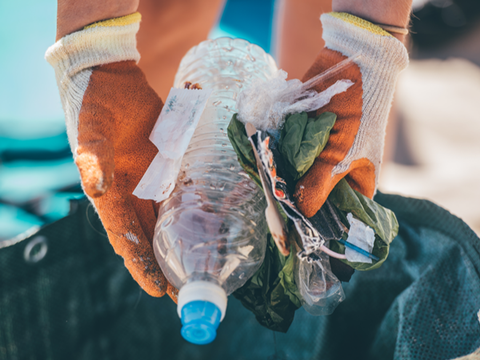
The Marine Conservation Society says that its beach clean data has shown an average drop of 80% in carrier bags found washed up on UK beaches.
Following the introduction of charges on carrier bags over the last decade, the organization states data from its volunteers has shown the number of carrier bags washed up on beaches is coming down. It adds that it campaigned for the charges to be introduced across the UK, which has led to this reduction.
It hopes that data from its volunteers this year will show a drop in other litter items that have recently had policies introduced to try and reduce their use, such as single-use plastic cutlery, balloon sticks, polystyrene cups and food containers.
Beachwatch manager Lizzie Price said: “It is brilliant to see policies on single-use plastics such as carrier bag charges working. There is no doubt that these policies have been extremely successful in reducing this frequently littered item. But we cannot afford to rest on our laurels.
“Our volunteer surveys show 9 out of 10 beach litter items are made from plastic, and drinks-related litter, like bottles and cans, were found on 97% of UK beaches surveyed last year.
“We need broader policies that charge or ban more single-use items where possible such as the proposed Deposit Return Schemes for plastic bottles, cans, and glass. We must move quicker towards a society that repairs, reuses and recycles.”
The Marine Conservation Society’s beach litter surveys have been running for 30 years, all year round, but a third of its data comes from volunteer surveys during the annual Great British Beach Clean event. Volunteer findings from last year are available in the Society’s 2023 State of our Beaches report.
Last year, packaging consultancy Duo and Danish plastic recycler Plastix created a shrink film utilizing a recycled plastic material made from waste fishing gear. Made from 98% maritime waste like fishing nets and ropes, Plastix says its technology enables the maritime industry to minimize waste fishing gear pollution, which could otherwise end up in the oceans.
Greiner Packaging and Plastic Bank extended their partnership to collect plastic waste from coastal areas in the Philippines at the end of 2023, an effort said to have already removed over 610 tonnes of plastic. Plastic Bank is seeking to develop ‘ethical recycling ecosystems’ through five collection points in Manila, which involves rewarding collectors with a bonus for the plastic they collect to bolster their income.
In April we spoke to Prevented Ocean Plastic’s Raffi Schieir as part of our Packaging Europe podcast series. We discussed the challenges and myths around ocean plastics and he explained why prevention through high quality collection and sortation systems is key to solving the problem.
If you liked this story, you might also enjoy:
How are the top brands progressing on packaging sustainability?
Sustainable Innovation Report 2024: Current trends and future priorities
Reuse vs. single use – which is better for the environment?
The ultimate guide to global plastic sustainability regulation














No comments yet